Weight Gain After Keto Diet
There has much been much debate on low carb diets vs keto diets and the differences between the two diets.
Low carb diets have been rising in popularity with no signs of dropping off. This is not surprising when you consider the success of thousands and thousands of low carb dieters who have rapidly lost weight and kept it off while improving their overall health at the same time.
Even the current literature supports the effectiveness of low carb diets for weight loss and health improvement. Furthermore, many studies also show that carb restriction can be used to aid the treatment of conditions that low-fat diets may make worse.
Unfortunately, if you try to figure out the best low-carb approach, you will be overwhelmed with biased and conflicting information. Some websites claim that the keto diet is the best low carb diet because you get the benefits of ketosis and low-carb dieting at the same time, while others believe a more lenient low-carb diet is the way to go because keto is too restrictive and risky.
What information should we trust? Well, it depends on the person.
The first step to understanding what diet may work best for you is understanding the difference between low carb diets and the ketogenic diet. After we sort out the technical differences, we will then dig through the research to help you decipher what may be optimal for you.
The Low Carb Diet vs. the Ketogenic Diet – The Technical Differences
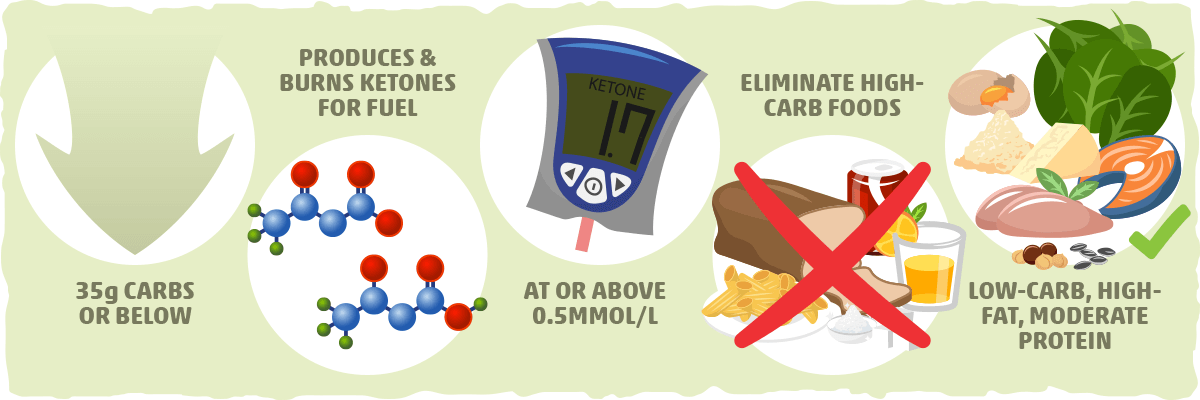
Simply put, a ketogenic diet or "keto diet" is a low-carb diet, but not all low-carb diets are ketogenic diets.
The primary goal of the keto diet is to help you achieve and sustain nutritional ketosis – a metabolic state that occurs when the body consistently produces and uses ketones for fuel. Restricting carbs below 35 grams per day is usually all you need to do to enter and sustain ketosis.
Whether you are on a keto diet or not can easily be answered by measuring your blood ketone levels. Are your ketone levels at 0.5 mmol/L or higher after implementing the keto diet for a week or so? This indicates that you are legitimately on the keto diet while any measurement lower than 0.5 mmol/L technically means that you are on a low carb diet, not a keto diet.
Unfortunately, an equally precise definition of what a "low carb diet" is does not exist. Even the research literature doesn't seem to have a definitive answer that allows us to decipher a low carb diet from higher carb diets.
Some studies define low-carb as a diet that restricts carbs below 20% of calories while other studies classify it as a diet that consists of less than 45% carbs. The only thing that most people seem to agree on is the concept behind the low-carb diet: to reduce carb intake by cutting out carb-rich, processed foods.
More specifically, most low carb diets limit foods high in easily digestible carbohydrates (e.g., sugar, bread, pasta, juice, soda) and replace them with foods containing a higher percentage of fats and moderate protein (e.g., meat, poultry, fish, shellfish, eggs, cheese, nuts, and seeds) and other foods low in carbohydrates (e.g., non-starchy vegetables such as spinach, kale, chard and broccoli), although other vegetables and fruits (especially berries) are often allowed. The restriction of carbohydrates and certain food groups vary between the different low-carbohydrate diets.
A Brief Overview of the Most Popular Low Carb Diets
Due to its simple concept, the low carb diet can be approached in a variety of different ways, some of which have become highly popular over the past decade. To demonstrate the wide range of possibilities when it comes to cutting carbs, let's take a look at some of the most popular low-carb diets:
1. A Typical Low-Carb Diet
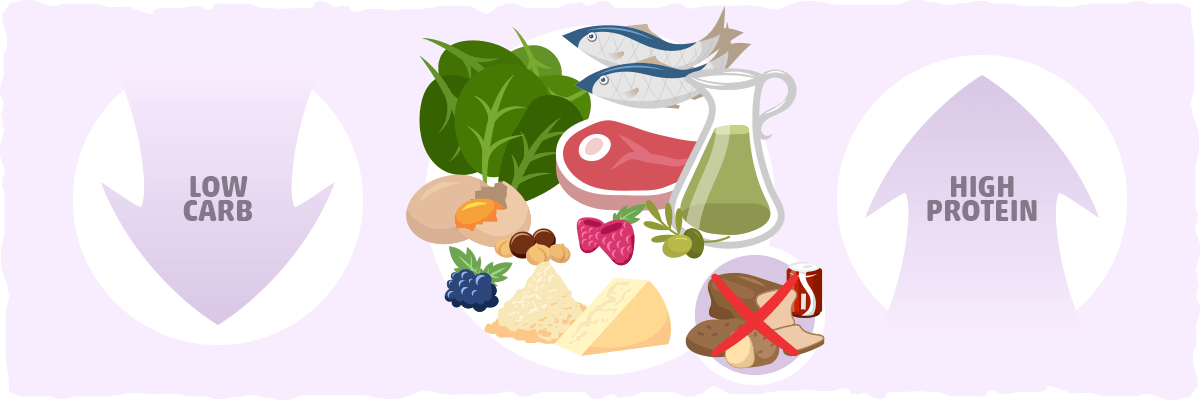
The typical low-carb diet does not have a fixed definition. This diet tends to be lower in carbs, and higher in protein than a typical "Western" diet.
This type of low-carb diet is usually based on meats, fish, eggs, nuts, seeds, vegetables, fruits, and healthy fats. It minimizes the intake of high-carb foods like grains, potatoes, sugary drinks, and high-sugar processed foods.
By switching to this dietary approach from a higher-carb, westernized diet, most people will lose weight and improve their health. Low carb dieters will typically decrease carbs to increase weight loss and increase carbs to maintain their weight and/or fuel high-intensity exercise.
2. The Atkins Diet
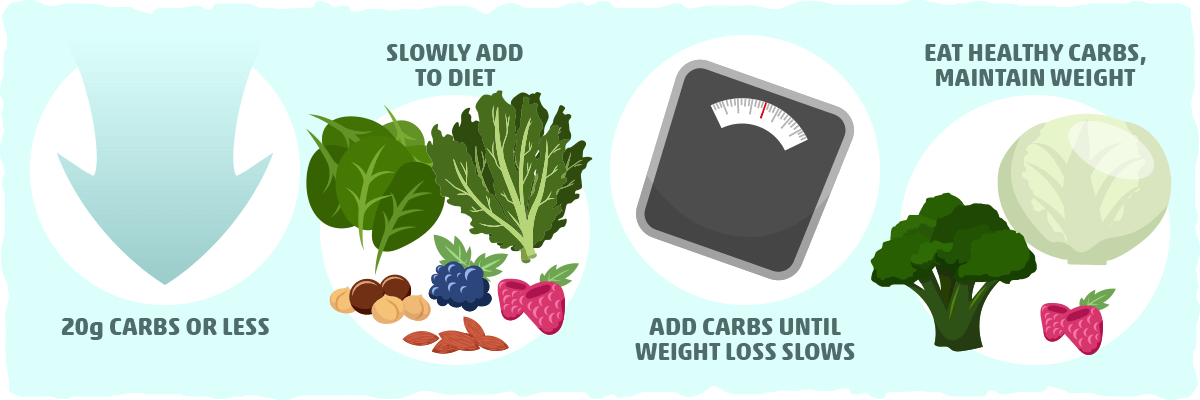
The Atkins diet is one of the best known low-carb diet plans. This diet involves reducing all high-carb foods while eating as much protein and fat as desired.
The traditional Atkins diet is split into 4 phases:
- Phase 1 – Induction: Eat under 20 grams of carbs per day for 2 weeks. This is very similar to a strict ketogenic diet.
- Phase 2 – Balancing: Slowly add more nuts, low-carb vegetables, and fruits to your diet.
- Phase 3 – Fine-tuning: When you get closer to your goal weight, add more carbs until weight loss becomes slower.
- Phase 4 – Maintenance: Once you've reached your goal, eat as many healthy carbs as your body tolerates without gaining back the weight you lost.
The Atkins diet is very well researched and has been shown to be both safe and effective for many people. For more information on the differences between Atkins and Keto, click here.
3. Eco-Atkins
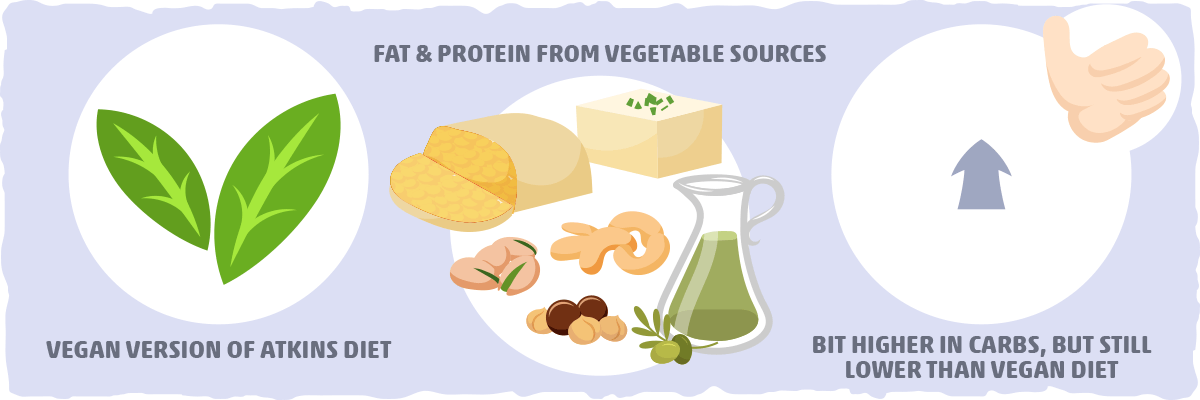
The Eco-Atkins diet is basically a vegan version of the Atkins diet for those that want to cut carbs without eating so many animal products. It focuses on plant foods and ingredients that are high in protein and/or fat, such as seitan, soy, nuts, and plant-based oils.
Due to the focus on plant foods, it is a bit higher in carbs than a typical Atkins diet, but still much lower than a typical vegan diet.
There aren't many studies on this particular version of a low-carb diet, but it does seem to be safe and effective for weight loss and improving some aspects of health. For example, one 6-month study showed that subjects who were following the Eco-Atkins diet experienced more weight loss and greater improvement in heart disease risk factors than those who were on a high-carb lacto-ovo-vegetarian diet.
4. A Low-Carb, Paleo Diet
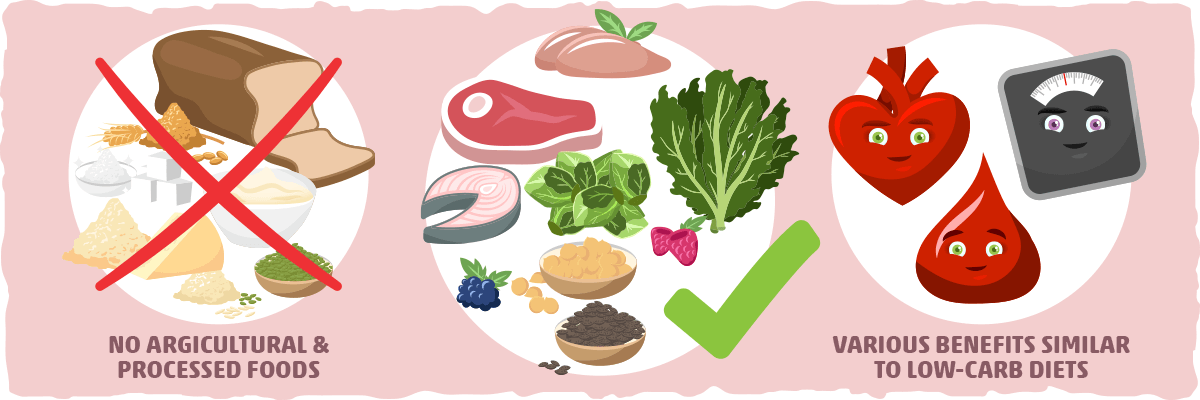
The Paleo diet is currently one of the most popular dietary approaches. This diet involves eating foods that were likely available in the paleolithic era and limiting the intake of foods that became popular after the agricultural and industrial revolutions.
A Paleo diet doesn't focus on restricting carbs, but since it cuts out many of the most popular food items we eat today, it naturally is lower in carbs. The standard paleo diet eliminates processed foods, added sugar, grains, legumes, and dairy products, and focuses on high-quality meats, fish, vegetables, fruits, and some nuts and seeds.
There are several small studies showing that a Paleo diet can cause weight loss, a reduction in blood sugars and improved risk factors for heart disease, similar to what occurs as a result of following other low carb diets.
Many other popular versions of the Paleo diet exist, such as the primal blueprint and the perfect health diet. All of them tend to be much lower in carbs than a typical Western diet.
5. A Scandinavian Low Carb, High-Fat Diet (LCHF)
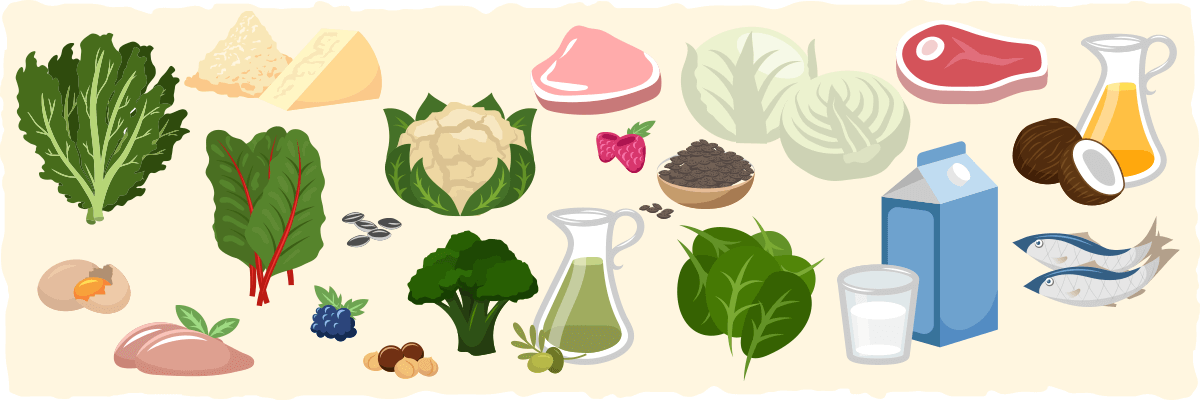
Sweden was one of the first countries to denounce the demonization of fat and welcome it with open arms. The primary purpose of the diet is to induce weight loss and prevent chronic diseases by reducing carbs and increasing fats.
The Scandinavian low carb, high-fat diet focuses more on food quality and is a bit more restrictive than the typical low-carb diet.
For example, the dietary staples are:
- Grass-fed beef, pasture-raised poultry, and other fatty meats
- Fish and seafood
- Cage-free eggs
- Full-fat dairy products
- Plant-based fats: Coconut and olive oil
- Low carb veggies: Cauliflower, broccoli, cabbage, kale, collards, bok choy, spinach, etc.
- Berries
- Nuts and seeds
And foods that should be avoided on this diet are:
- High-glycemic fruits
- Grains
- Starchy veggies
- Juices
- Processed or packaged food/drinks with added sugar
This diet is less strict than many of the diets on this list and may be one of the healthiest as well.
6. The Carnivore Diet (Zero Carb Diet)
The carnivore diet is based on the belief that we don't need plant foods or dietary carbs to survive. Some proponents of this approach think that the protective mechanisms in plants are what cause many common health issues, so following a diet that consists of all animal products may be the way to optimal health.
There is no research to back up the proposed health benefits of this dietary approach. In fact, the majority of the literature advises against limiting plant intake and deriving most of your calories from animal products, especially since they are lacking in important nutrients like vitamin C and fiber.
7. The Low-Carb Mediterranean Diet
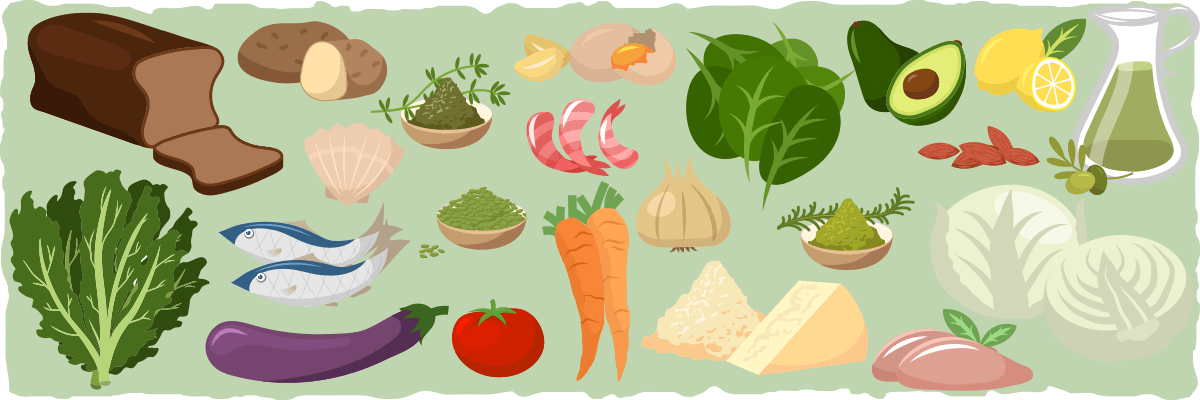
The Mediterranean diet is very popular, especially among health professionals and researchers, for its health benefits. It involves selecting foods that were (supposedly) consumed in Mediterranean countries during the earlier part of the 20th century. As a result, the diet primarily consists of vegetables, fruits, nuts, seeds, legumes, potatoes, whole grains, breads, herbs, spices, seafood, and extra virgin olive oil.
After decades of research on this dietary approach, the Mediterranean diet has garnered plenty of research backing up its health benefits.
A low-carb Mediterranean diet is basically a Mediterranean diet that limits higher-carb foods like whole grains, potatoes, and legumes. It is similar to a regular low-carb diet, except that it emphasizes more fatty fish instead of red meat, and more extra virgin olive oil instead of animal fats like butter.
Since it favors fatty-fish and olive oil, a low-carb Mediterranean diet may be better for heart disease prevention than other low-carb diets, although this needs to be confirmed in studies.
8. Tim Ferriss' Slow Carb Diet
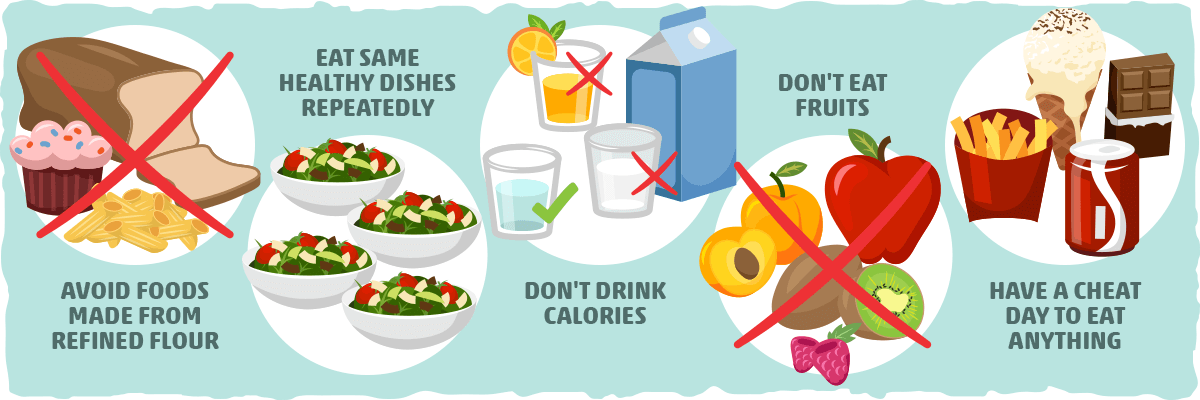
The Slow Carb diet was created in 2010 by author and entrepreneur Tim Ferriss, who published the rules in his best-selling book "The 4-Hour Body."
The diet follows these five simple rules:
- Rule #1: Avoid processed foods, bread, pasta and anything made with refined flour.
- Rule #2: Eat the same few healthy meals repeatedly
- Rule #3: Don't drink calories (except for a couple glasses of red wine each night, if preferred)
- Rule #4: Don't eat fruit
- Rule #5: Have a cheat day where you can each anything you'd like
The bulk of calories on the slow carb diet will come from:
- Proteins: Grass-fed beef, poultry, pork, fish, seafood and lactose-free plain whey powder.
- Legumes: Lentils, beans, chickpeas, and soybeans.
- Low-glycemic vegetables: Leafy greens, broccoli, cauliflower, kale, asparagus, peas, and other non-starchy veggies.
- Fats: Nuts, dairy-free creamer, macadamia oil, olive oil, and grapeseed oil.
- Spices: Salt, garlic salt and herbs.
With the occasional:
- Cottage cheese: It's the only dairy product allowed.
- Red wine: It's the only drink with calories allowed.
Although there has been no research done on this diet, it seems to promote similar weight loss and health improvements as other low-carb diets. This diet may be a good option for those who don't want to give up carb-rich foods completely.
9. Whole30 Diet
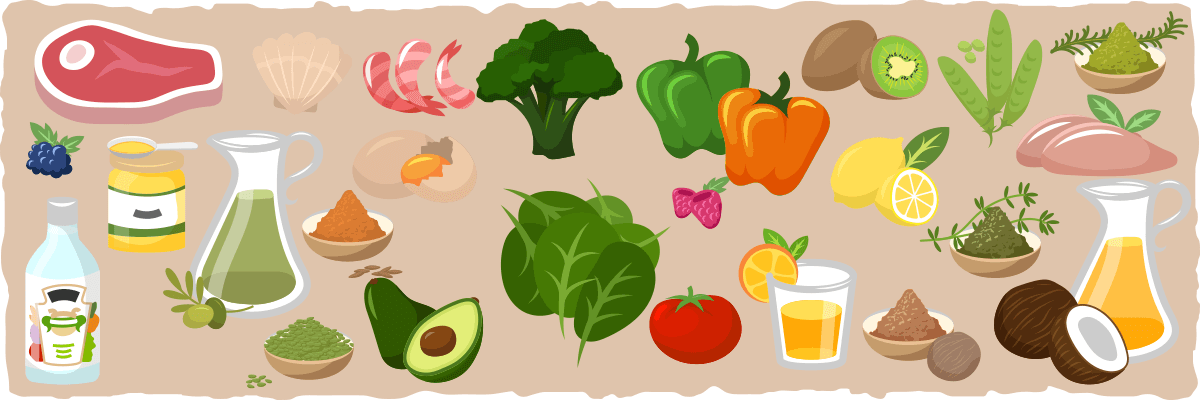
The Whole30 is a 30-day program which was created by sports nutritionists Dallas Hartwig and Melissa Hartwig in 2009. It was created with the purpose of eliminating potentially problematic foods for at least 30 days and only eating foods that have a health-promoting effect for most people.
To follow this diet, you simply commit to eating whole, low carb foods that aren't in the banned categories and avoid potentially harmful ingredients for 30 days.
The foods you can eat on this diet include:
- Proteins: Meat, poultry, seafood, and cage-free eggs
- Low carb veggies: Broccoli, spinach, tomatoes, peppers
- Low-glycemic fruits: Berries, kiwi, lemon
- Natural fats: Olive oil, coconut oil, avocado, ghee
- 100% fruit juices
- Specific legumes like green beans, sugar snap peas, and snow peas
- Vinegar
- Herbs and spices
The foods that you should eliminate completely for 30 days are:
- Added sugar, real or artificial: No maple syrup, honey, agave nectar, coconut sugar, and other added sugars
- Grains: Wheat, rye, barley, oats, corn, rice, millet, bulgur, sorghum, sprouted grains, all gluten-free cereals, bran, germ, and starch
- Legumes: Beans of all kinds, peas, chickpeas, lentils, peanuts, peanut butter and all forms of soy
- Dairy: Cow, goat or sheep byproducts such as milk, cream, cheese, kefir, yogurt, sour cream, ice cream or frozen yogurt
- Alcohol
- Carrageenan, MSG or sulfites
- Baked treats and junk food
Once these foods are eliminated from the diet for 30 days, the person can slowly add them back in to see how it affects their health and energy levels. If the food is problematic for the person in any way, then it is best to keep it out of the diet completely. On the other hand, foods that are well tolerated may be permitted in moderation.
No research has been done on this diet specifically, but it does have the potential to improve overall health and help people lose weight. This dietary approach may also be helpful for those looking to see if they are sensitive to foods that fall in the category of legumes, dairy, and grains.
10. The Ketogenic Diet
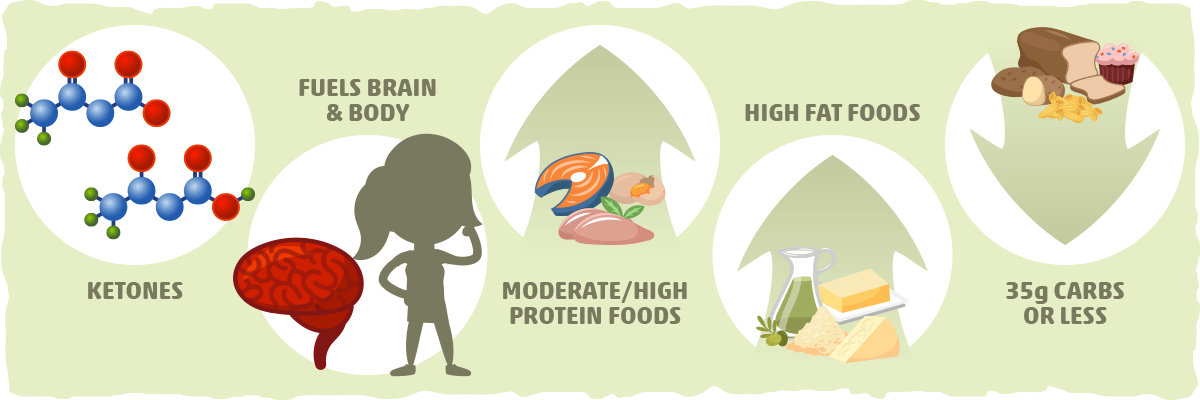
The ketogenic diet is designed to keep carb consumption so low that the body goes into a metabolic state called ketosis.
When carb intake is very low, insulin levels drop significantly, creating an internal environment that stimulates the release of large amounts of fatty acids from body fat stores. A lot of these fatty acids are transferred to the liver, where they may be turned into ketones.
Ketones (also known as ketone bodies) are water-soluble molecules that can fuel the majority of cells throughout the body, including most of the brain's cells. If the body is in ketosis for an extended period of time, ketones will eventually supply up to 50% of the body's basal energy requirements and 70% of the brain's energy needs. The glucose that is still required by the brain and body will be produced by the liver via a process called gluconeogenesis.
A ketogenic diet focuses on high-protein and high-fat foods, while some versions of keto try to limit the intake of high-protein foods so that the protein won't decrease ketone levels. Carbs are generally limited to less than 50 grams per day, though we recommend starting with 35 grams or less.
A conventional ketogenic diet is referred to as a "standard" ketogenic diet (SKD).
However, there are other variations that involve strategically adding carbs to fuel high-intensity exercise:
- Targeted Ketogenic Diet (TKD) – Add small amounts of carbs around high-intensity workouts. To learn more about this dietary strategy, check out our guide to the TKD.
- Cyclical Ketogenic Diet (CKD) – Eat a ketogenic diet on most days of the week but switch to a high-carb diet for 1–2 days each week. To learn more about this dietary strategy, check out our guide to the CKD.
The Bigger Picture – Which Low-Carb Diet is Best for You?
As you can see, there are a wide array of variations for the low-carb diet, and we haven't even scratched the surface of what is possible.
Each diet can be adjusted endlessly. The keto diet, for example, can also be converted into a dairy-free, vegan, or vegetarian diet that promotes ketosis.
This means that you can use the concepts from these low-carb diets to formulate a diet that helps you achieve your body composition goals and optimize your health at the same time. However, doing this requires us to dig deeper into the research on keto and low carb diets to understand the principles behind their effectiveness.
Which One is Better for Weight Loss?
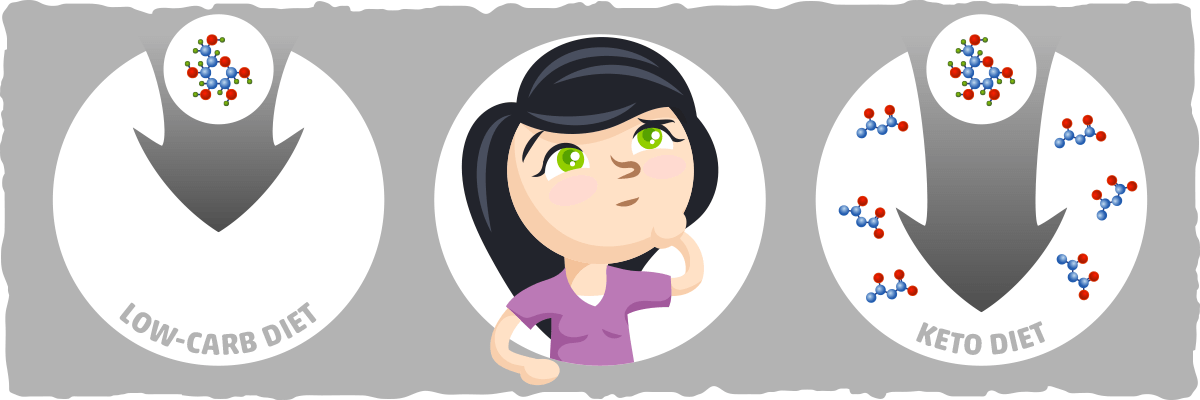
I have yet to find any research comparing a non-keto, low carb diet (that doesn't provoke sustained ketosis) to a keto diet, so it will be difficult to make direct comparisons regarding weight loss. Theoretically, it is tempting to think that keto diets are better since they restrict carbs more than most low-carb diets.
However, the current research literature doesn't support this belief. Meta-analyses that compare the keto diet (<50 grams of carbs per day) with low-fat diets and low-carb diets (<45% of calories coming from carbs) with low-fat diets indicate only a slight weight loss advantage for cutting carbs (roughly 2 pounds of extra weight loss after 6 months or more compared to a low-fat diet).
In other words, these three diets – keto, low-carb, and low-fat – can all help us lose similar amounts of weight after 6 months. This also suggests that there may not be a discernable difference in weight loss results between non-keto, low-carb diets and very low carb, keto diets.
Although no high-quality data exists that can help us make a direct comparison between keto diets and less restrictive low-carb diets, the current literature suggests that carb consumption may not be the most important variable when it comes to losing weight.
This theory gains further support when we include the data from a recent meta-analysis of controlled feeding trials that matched protein and calorie consumption while varying the carb and fat content of the diet. Analyzing studies conducted in this manner provides us with the most accurate way to decipher the differences between cutting carbs and cutting fat with everything else matched.
As expected from the results of the meta-analyses discussed earlier, the researchers found no significant difference between low-carb and low-fat diets when calorie and protein intake were the same for each group. Thus, the current data indicate that maintaining a caloric deficit is the key to weight loss, not carb restriction.
With that being said, low-carb diets do seem to provide us with a real-world advantage over higher-carb, lower-fat diets. By "advantage" I don't mean a metabolic advantage; I am referring to the impact that low-carb diets have on satiety.
More specifically, there are two key principles that explain why cutting carbs work so well for weight loss:
- By restricting carbs, you naturally increase your consumption of high-fat, protein-dense, and fiber-rich foods. These foods boost satiety levels in the short- and long-term, which causes you to eat fewer calories than before.
- By restricting carbs, you are eliminating virtually all calorically-dense processed foods from your diet. These foods are typically so palatable that they cause us to consume too many calories and gain fat.
In other words, by following a low carb diet, we tend to consume fewer calories than usual and lose weight. This may explain why low carb and keto seem to provide similar amounts of weight loss (when compared to low-fat diets).
Could Keto Give Us Slight Fat Loss Advantage?
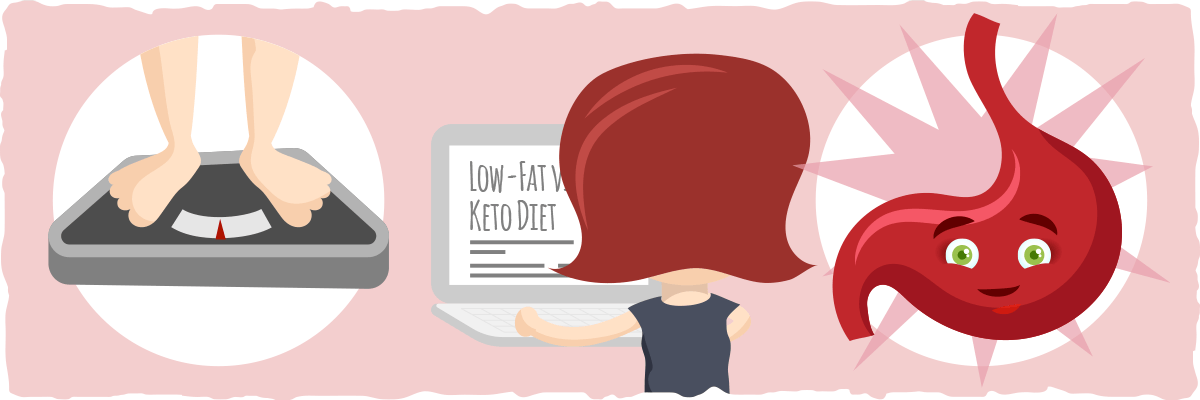
However, it is also possible that keto diet can increase satiety and weight loss more than a non-keto, low-carb diet because by cutting carbs low enough we can leverage the benefits of a low-carb diet along with the hunger-suppressing properties of ketones.
How much extra weight loss someone can get from being in ketosis is unclear. Research has yet to directly explore the effect that ketones can have on our calorie consumption and body composition.
In summary, the data suggest that non-keto, low-carb diets, and keto diets lead to similar amounts of weight loss. Even if future research shows that keto increases weight loss more than other low-carb diets, I doubt the difference will be significant enough to crown the keto diet as the best diet for weight loss for everyone.
However, we must remember that weight loss isn't the only thing we should be focused on when making diet decisions. The most important variable to consider, first and foremost, is how your diet and lifestyle affect your overall health.
Short-Term Health Effects
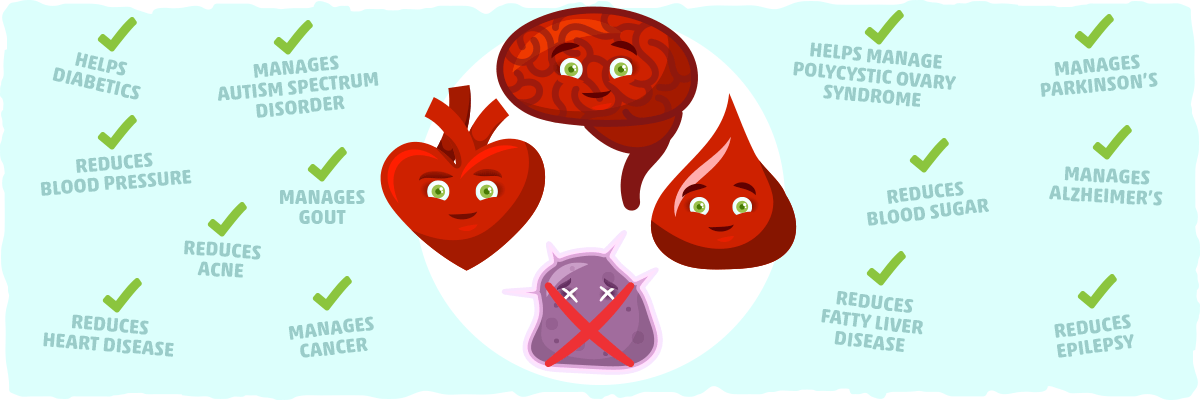
Let's dip our toes into the pool of health by summarizing the current data on low-carb diets and how they affect different health conditions and biomarkers of health. Some of the most well-studied and well-known biomarkers are triglycerides, cholesterol, blood sugar, A1c, and blood pressure, and all of them have been found to improve significantly as a result of cutting the carbs (for most people).
Research also indicates that low carb diets can help people with the following conditions:
- Type 2 Diabetes
- Type 1 Diabetes
- High Blood Pressure
- High Blood Sugar Levels
- Heart Disease
- Polycystic Ovary Syndrome
- Fatty Liver Disease
- Acne
Some evidence suggests that a keto diet may be more effective than a less-restrictive low carb diet at helping patients with diabetes, high blood sugar levels, high blood pressure, fatty liver disease, and polycystic ovary syndrome. Furthermore, keto diets have been found to help patients who have:
- Alzheimer's disease
- Parkinson's disease
- Epilepsy
- Autism Spectrum Disorder
- Gout
- Cancer
Nutritional ketosis is the secret ingredient behind the positive effects that keto can have on the neurological disorders listed above, gout, and many types of cancer.
In short, the keto diet may be more helpful and healthier than a less-restrictive low carb diet if you have one of the conditions listed above. With that being said, carb consumption does play an important role in our health (mainly by helping with hormonal regulation and replacing excess calories from fat). Because of this, some people may experience a worsening of their health as a result of following a keto diet.
How to Know if a Keto Diet is Healthy for You

Although carbs aren't essential, it is possible to experience issues with your cholesterol levels, adrenal health, and/or thyroid output as a result of following a keto diet. This is why we strongly advocate getting relevant biomarkers checked at least a month after starting the keto diet to see if it is improving your overall health or making existing conditions worse.
If the keto diet isn't improving your overall health, then it may be best to increase your carb consumption until your relevant biomarkers improve (cholesterol levels, thyroid hormone levels, etc.). However, this doesn't mean you should just start eating whatever processed food is available because this will make your health even worse.
Instead, it is best to follow a whole-food-based, low-carb diet like the Paleo diet or a low-to-moderate carb Mediterranean diet. After a month or so of following your new approach, it may be best to get another blood test to see how your biomarkers are doing.
Long-Term Health and Longevity
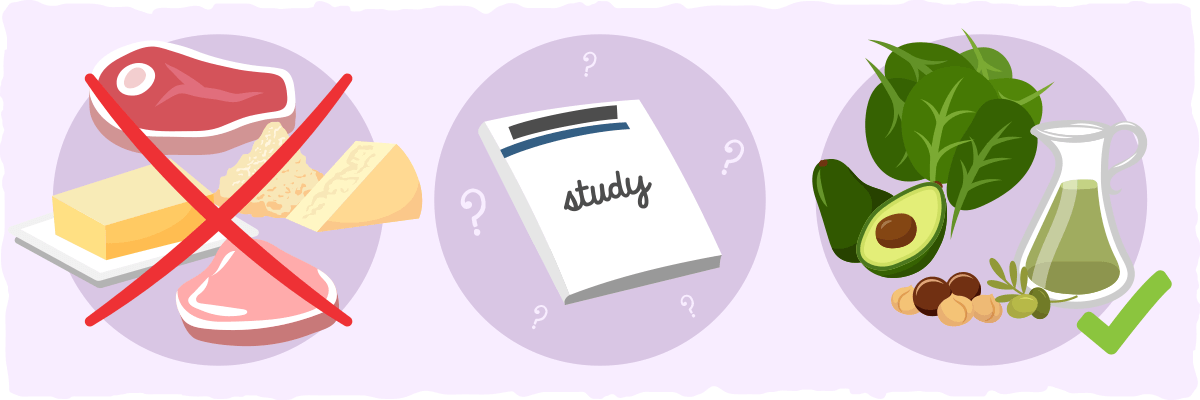
A 2018 observational study and meta-analysis was recently published in the Lancet on the topic of carb consumption and mortality risk, and many news outlets spun the data in a way the made low carb dieting look lethal. However, when we look at all of the data from the original study, a much more nuanced pattern unfolds.
In general, it does seem plausible that a low carb diet leads to a reduced lifespan, but only when it derives most of its calories from animal products (i.e., animal fats, meat, and processed meats). However, when low carb diets consist of more plant-based foods, such as vegetables, nuts, legumes, and grains, mortality risk decreases significantly.
In other words, a low-carb, carnivore-type diet is probably not good for health for most people in the long term, and a plant-based, low-carb diet may reduce our mortality risk more than a moderate carb diet (the one diet that many news articles claim to be healthiest after reading the study).
With that being said, determining what the best diet is for long-term health depends on the individual. In general, replacing high-carb processed foods and processed meats with more plant-based whole foods is a good place to start.
Once the diet starts to trend in the direction of more whole foods and less processed foods, health and body composition tend to improve. Whether or not you get more strict with carb consumption depends on how well you do with nutritional ketosis and what happens to your health as you decrease carbs and increase fat and protein.
As we discovered earlier, some people may fare better with a diet that doesn't increase fat consumption and decrease carb intake so much, while others may thrive when they are in nutritional ketosis.
If you would like to see more practical information on how to formulate a healthy diet, I recommend checking out this article. Although it focuses primarily on the keto diet, the principles that you will find throughout the article will help you create a healthier diet for you regardless of how low-carb you decide to go.
Which One is Easier to Follow
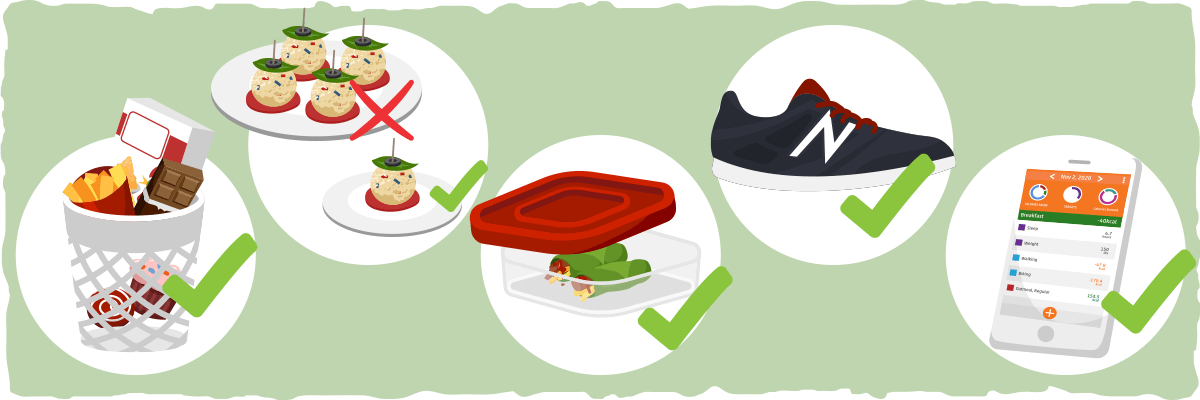
One of the most important dietary principles that many of us forget about is how easy is to follow. Most of us can get motivated for short-term weight loss, but will you have the discipline to sustain your dietary approach for longer than a few months?
When it comes to improving your health and losing weight, consistency is key. More specifically, we must follow a diet that can consistently help us achieve our goals and sustain our results without rebounding.
In other words, if you can't turn your dietary approach into your new long-term lifestyle, then it is best to avoid it.
For most people, the more restrictive a diet is, the harder it will be to sustain for longer periods of time. This means that it may be more difficult for many of us to stick with the keto diet compared to a non-keto, low-carb diet.
When you are choosing a dietary approach, you must be completely honest with yourself. Don't forget to consider factors like what your family eats, your food environment, your lifestyle, and your current habits.
Do you think you could stick with this diet without rebounding back to old habits months later? If not, what do you think you can do to help you achieve and sustain your results without it being a constant struggle?
Need help? Here are some strategies that can make your results easier to achieve and sustain:
- Try a different diet that fits better with your lifestyle.
- Try mixing different diets together (e.g., switch between Keto and a Paleo diet every few months).
- Use smaller plates/portion sizes to decrease the amount of food you eat at each meal.
- Remove all unhealthy foods from your house and never buy them again.
- Have healthy food options readily available and make unhealthy foods much harder to attain and consume.
- Increase your activity levels throughout the day (e.g., use a standing desk, go for walks, do light stretches, take dance breaks).
- Track your calorie intake with a calorie tracking app.
- Have a healthy snack with you while you are on the road to keep you from stopping for fast food.
- Try skipping breakfast (intermittent fasting).
If you are not sure what to try, shift your thoughts to a long-term perspective. Which strategy can you easily make a part of your lifestyle? Give it a try for at least a month and asses your results to see if you want to continue using it, add another strategy to it, or experiment with something else.
And always remember that slow and steady wins the race, especially when it comes to weight loss and health optimization. Those who lose weight at a gentle pace of 1 to 2 pounds per week are much more likely to keep it off than those who lose weight at a much faster rate.
As we discussed before, the key to losing weight is sustaining a calorie deficit. Being in ketosis and restricting carbs can help, but if you constantly struggle with these two things, then you may need to follow a less restrictive diet that helps you maintain a calorie deficit and improve health by using other methods.
Non-Keto, Low Carb Diets vs. the Keto Diet – Which One is Better Overall?
Is keto the king of the low-carb category? Is one low-carb diet better than the others? As with most health-related questions, the most accurate answer is "it depends." Every popular variety of the low-carb diet has the potential to improve health and help people lose weight, but each one affects each person differently.
The keto diet, for example, may be the best diet for people who respond well to it from both a subjective (i.e., improved sense of well-being) and objective (i.e., improved biomarkers and body composition) perspective. Plus, the abundance of ketones that we produce when following this dietary approach may stimulate more weight loss, enhance cognitive function, and improve other aspects of health. Keto may also be the best diet for patients who have epilepsy, Parkinson's disease, Alzheimer's disease, and some types of cancer.
On the other hand, non-keto, low-carb diets may be a great way for people to improve their overall health and body composition without having to worry about their ketone levels. Since low-carb diets favor more satiating foods (i.e., foods that are high in fiber, fat, and/or protein), people that follow these diets tend to feel fuller, eat fewer calories, and lose weight. A less restrictive low-carb diet tends to be much more sustainable as a long-term lifestyle and healthier for those who struggle with high cholesterol levels, adrenal issues, and/or thyroid issues.
To better illustrate the similarities and differences between a non-keto, low carb and a keto diet, let's take a look at this diagram:

What do you think will work best for you?
In general, if you decide to decrease carb consumption for any reason, the current research indicates that most people will reduce their mortality risk and improve overall health by subbing out highly processed foods and animal products for low-carb, minimally-processed plant foods.
It is also important to consider how consistent you can be with your diet. Complicated diets that you cannot envision yourself following for longer than a few months are not even worth trying. The best method to get leaner, have more energy, enhance mental focus, and optimize overall health is to adopt a healthier lifestyle that you can maintain indefinitely.
The first step to adopting a healthy lifestyle is choosing a diet that is backed by research to provide the benefits it claims and adjust your approach from there. To help you assess what diet to start with, here are some of the most important qualities of a healthy diet:
- It is an accessible and sustainable lifestyle change for you.
- It has been scientifically proven to provide the benefits that you are looking for.
- It provides you with a wide variety of micronutrients from several food groups.
- It uses simple food rules that you can follow.
As you start making adjustments to your diet and lifestyle, make sure you are keeping track of these variables:
- How you feel
- The changes in your body composition
- Relevant biomarkers
When each one is trending in the right direction, you will know that you are making healthy diet and lifestyle choices for you.
For those of you who think that the keto diet is worth a try, I recommend checking out our recent article on how to start the keto diet. In it, you will find the information you need to adopt a healthy keto lifestyle and links to articles that address your specific needs.
Sources
- The 8 Most Popular Ways to do a Low-Carb Diet – Healthline
- One-Third of Americans Are Dieting, Including One in 10 Who Fast … While Consumers Also Hunger for Organic, "Natural" and Sustainable – Food Insight
- Very-low-carbohydrate ketogenic diet v. low-fat diet for long-term weight loss: a meta-analysis of randomised controlled trials – British Journal of Nutrition
- Systematic review of randomized controlled trials of low-carbohydrate vs. low-fat/low-calorie diets in the management of obesity and its comorbidities. – NCBI
- Effects of Low-Carbohydrate Diets Versus Low-Fat Diets on Metabolic Risk Factors: A Meta-Analysis of Randomized Controlled Clinical Trials – NCBI
- Low Carbohydrate versus Isoenergetic Balanced Diets for Reducing Weight and Cardiovascular Risk: A Systematic Review and Meta-Analysis – NCBI
- A Ketone Ester Drink Lowers Human Ghrelin and Appetite. – NCBI
- Dietary carbohydrate intake and mortality: a prospective cohort study and meta-analysis – The Lancet Public Health
- Low-carbohydrate diets and all-cause and cause-specific mortality: Two cohort Studies – NCBI
- Low-carb diet linked to early death, medical study suggests – USA Today
- Moderate carbohydrate intake may be best for health, study suggests – Science Daily
- The Hungry Brain — STEPHAN J GUYENET, PhD
- Obesity Energetics: Body Weight Regulation and the Effects of Diet Composition. — NCBI
- Effects of low-carbohydrate vs low-fat diets on weight loss and cardiovascular risk factors: a meta-analysis of randomized controlled trials — NCBI Bookshelf
- Very-low-carbohydrate ketogenic diet v. low-fat diet for long-term weight loss: a meta-analysis of randomised controlled trials — British Journal of Nutrition
- The Benefits of The Ketogenic Diet – Ruled.me
Source: https://www.ruled.me/low-carb-vs-keto-diet-whats-the-difference/